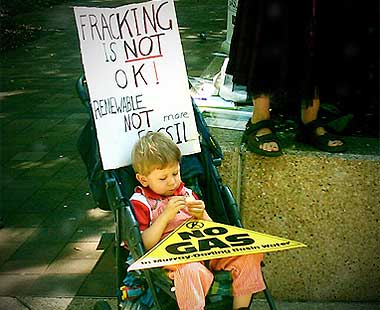 Photo: Erland HowdenNatural gas obtained through "fracking" — the increasingly common process of splitting open underground deposits with high pressure chemicals — now has an even bigger strike against it than its potential to contaminate regional water supplies. Fracking, it turns out, yields more global warming per unit of energy than coal — at least 20 percent more, and possibly up to twice as much.
Photo: Erland HowdenNatural gas obtained through "fracking" — the increasingly common process of splitting open underground deposits with high pressure chemicals — now has an even bigger strike against it than its potential to contaminate regional water supplies. Fracking, it turns out, yields more global warming per unit of energy than coal — at least 20 percent more, and possibly up to twice as much.
Those are the bombshell findings of a new study [PDF] released by a trio of scientists at Cornell University. It turns out that after the fracking process, when the high-pressure drilling fluid is flowing back up the well, large quantities of methane gas travel with it. These and other “fugitive” emissions amount to approximately 2 percent of the natural gas released by a fracked well, which is a thousand times more than similar emissions of methane from conventional wells.
Methane is an extremely potent greenhouse gas — it's 100 times as powerful a heat-trapping gas as CO2 over a 20-year time frame — which means that fracking could provide a significant kick to global warming in the near term. Over longer periods, methane is less harmful, because it breaks down faster (into CO2, ironically). But even over 100 years, natural gas from fracked wells is significantly worse for the climate than coal.
Does this mean we should return to the 19th century model of industrialization? No, say the study’s authors, who emphasize that this study is not the last word on this subject.
These results suggest, however, that the Obama administration-supported "clean energy" standard, which includes natural gas, might be in that aspect actually worse for the climate than plain old business-as-usual coal-fired power.
Critics of the study point out that natural gas has other advantages over coal — it leads to less conventional air pollution and premature death, for one — but given the controversy already surrounding fracking, it now appears that this process could become, on balance, no better than our current addiction to coal.




